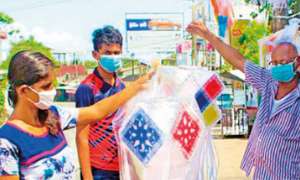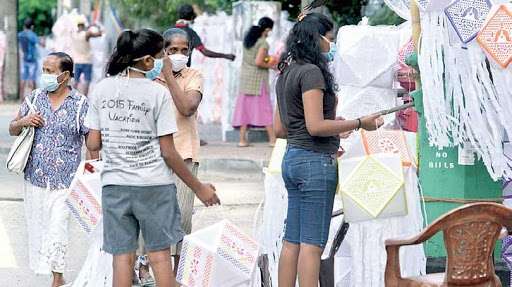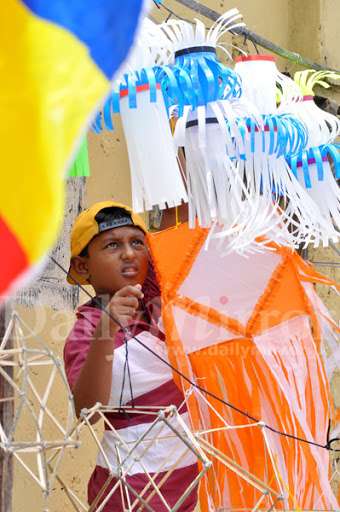
May 07 2020.
views 499Vesak, a religious holiday that signifies the birth, enlightenment, and death of Gautama Buddha lately became an occasion to go sight-seeing, visit dansals and earn some extra bucks. Then there were those who awaited the Vesak season to find money by constructing pandals, large scale Vesak lanterns, and in a way, it was an occasion that empowered a community of skilled artists that always get neglected by society. This year’s Vesak, however, is bound to be more peaceful than during previous years due to the COVID-19 outbreak. Therefore, people will be able to reflect on the true values of Buddhism while at home.

Evolution of Vesak
Vesakha (the Pali/Sanskrit name for Vesak) has not always been a major celebration in most Buddhist countries, writes Venerable S. Dhammika in his book titled ‘On the History of Vesak’. In Thailand it was only a low-key ecclesiastical holiday until 50 years ago, as was Magha Puja and Wan Asanha Bucha. The big holidays and celebrations were Hindu ones; Songkran, Loi Krathong etc and in the north of the country Inthakin, the water throwing festival, and several others. In Sri Lanka, campaigning in the early 1880s to have Vesakha made a public holiday continually failed until Colonel Henry Steele Olcott who embraced Buddhism went to London to petition the British authorities and finally succeeded in 1885. He led the Buddhist revivalist movement and pioneered Buddhist education in the country.

The book further states that the earliest reference to the Vesakha celebrations in Sri Lanka is from 1st Century BCE. It must have been a major, probably the most major religious festival. In the Mahavamsa, the reign of some kings is measured by how many Vesakhas they have celebrated. The Mahavamsa reports that Sena II ‘celebrated the Vesakha festival with the poor, giving them food and drink and clothing as they desired’. The Chinese pilgrim Faxian (also known as Fa Hsien) spent two years in Sri Lanka at the beginning of the 5th Century. He witnessed one festival of the Tooth Relic during which large brightly coloured depictions of all the Jataka stories ‘looking completely lifelike’ were set up on each side of the roads in the capital.

Again, this is interesting because it could well be an account of how Vesak is celebrated in Sri Lanka today. At main intersections in many cities and towns, large plywood boards with illustrations of Jataka stories or events in the life of Buddha painted on them are erected. Nowadays most of these pandals as they are called, are illuminated with thousands of light bulbs, some of the figures move, and loudspeakers explain each story. In Faxian’s day, they would have been illuminated by oil lamps.
Several decades later, in 1999, the United Nations General Assembly unanimously adopted Resolution 554/155, moved by the late Lakshman Kadirgamar, the then Sri Lankan foreign minister. Vesak Full Moon Day is now accorded as a United Nations Observance Day.
An opportune time to learn the true meaning of Vesak
“Vesak was a commercialized event all this while but this time people will be able to learn its true meaning,” opined Venerable Pahiyangala Ananda Sagara Thera, convener of Protect Sri Lanka Organisation. “In fact this virus has come in as a blessing for all of us to stay at home and engage in religious activities during the Vesak full moon poya day. It has also given us an opportunity to make Vesak lanterns on our own without buying lanterns that come from abroad. You can encourage children to make lanterns and allow them to explore their creativity. Then there are many homeless people out there. So you can look out for them in your neighborhood and give them some food and essentials during these trying times. On the other hand, there are many stray animals that don’t have food as well. These are some charity work people could engage in.”

Thoughts from people.
With curfew being imposed, people are making plans to celebrate Vesak from home. Here’s what a few of them had to say :
Biman - Explore if there is a better way than playing the Rathana Suthraya 24/7 to go about the present situation and ease out fears. Maybe notice that the situation is quite conducive to practice some meditation, and even though maybe difficult, be wise and do that instead. Also, great time to practice giving since there's a lot of people in need. Give what you can. Every bit helps.
Sharmini - I will light oil lamps and seek blessings for all to be away from this virus.
Kumar - Quality time to get into the true essence of Buddhism – Introspection.
Dayani - Will certainly be reflecting on self and meditate that people of this country in particular become wise and that they select right people to the Parliament.
Ramesh - Vesak was never about roaming around and going to places, eating from dansal, etc. Now it has become an occasion for people to hang out with friends. People should realize the true meaning of Buddhism, not the mainstream commercial religion. This year people can look into themselves and spend time with meditation and seek inner peace. If they have children they can teach their kids about actual values about our culture and the true meaning of the philosophical Buddhism.
Wasana - I'm going to make a Vesak lantern using waste materials. I'm going to teach my daughter about Vesak and how we can spend that day while at home.
Kanishka - It’s going to be the first Vesak for our baby. So will keep it simple. We plan to light some oil lamps to mark its significance and to show respect to all the people who are helping to fight the COVID-19 outbreak.
Arabind - Irrespective of what religion you are it would be good if you could do some charity work even on a small scale.
However, those who looked forward to Vesak from a commercial perspective are facing a challenge. Despite curfew regulations, some of them are seen selling lanterns on the roadside. Apart from that, with the latest online delivery trend, several community organizations are empowering people who make lanterns to sell their products on delivery apps. So be on the lookout.
We wish you a peaceful Vesak!
0 Comments